Transforming a preschool’s governance structure
Parents, staff and board of Amares, a successful preschool in Cologne, Germany, changed the organisation’s legal structures, while maintaining the integrity of its values and pedagogical approach, involving parents as much as they wish and as little as is necessary, reducing costs for all families and making it more accessible for families on lower income.
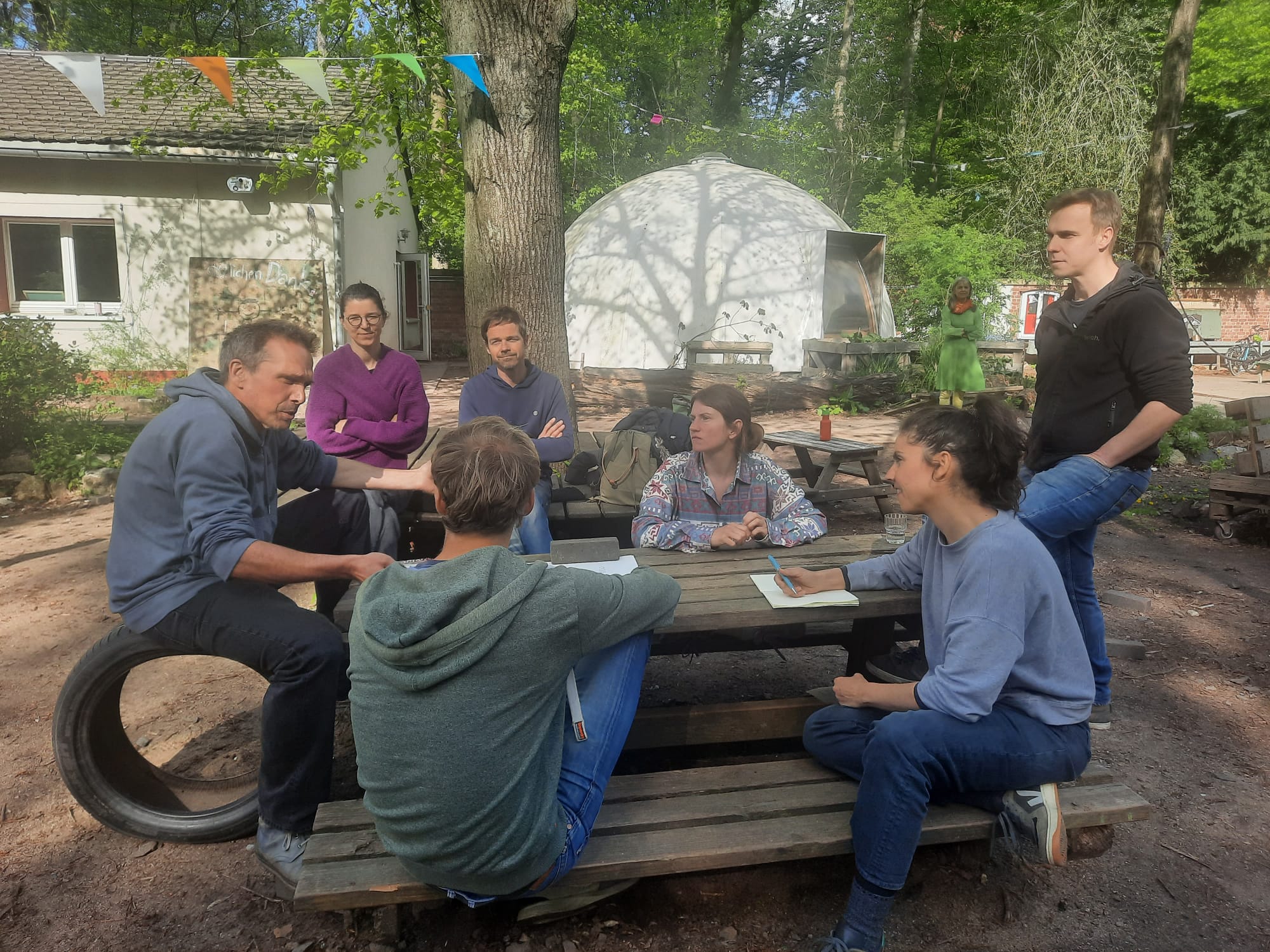
This case study was written by Sabine Virani after interviews with Vanda Perez Bessone who held this process.
In 2020, thanks to a near-crippling change in state legislation, many preschools in North-Rhein Westphalia, Germany, faced an existential dilemma. Up until then, the state government had funded 92% of their basic budget, with parents paying the rest for this form of childcare and non-compulsory education. The new law made it illegal to require parents to contribute toward the remaining eight per cent; from then on, schools were only allowed to request voluntary contributions from parents. And if a school refused to comply, it would lose the entirety of its government funding. While the majority of urban and rural districts in the state stepped in to cover the final 8% of preschools’ budgets, some did not. Cologne was one that did not.
Based in this city, Amares is a nature preschool that offers both indoor and outdoor experiences for children ages one to six. Founded in 2007, Amares now offers places for 85 children. This small, non-profit organisation is built on principles of holistic, experiential and interactive learning and dialogue. The school is a vibrant community, with staff and parents alike deeply committed to Amares’s unique pedagogical approach.
In response to the 2020 law, all preschools had two options: either raise their funding gap through voluntary contributions only, or become a parent-led association. A significant advantage of the latter was that they would receive a larger 96.7% of their basic budgets from the state; a disadvantage was that parents would have to take on legal responsibility for everything beyond the care of the children, including financial security and health and safety – an onerous and time-consuming set of responsibilities for parents to bear. The Amares board, staff and parents alike shared another concern: the core principles integral to the school’s ethos could be lost if parents became the primary decision makers.
To avoid such impacts, Amares’s board chose the first option immediately after the law changed in 2020: governance and decision-making powers were kept as they were, and Amares hoped to raise the funding shortfall through voluntary contributions. However, it soon became clear that the model wasn’t sustainable: far more time was spent on admin and discussions with parents, less income came in and there was little financial security. By the end of 2022, Amares was at a breaking point: with an annual budget of over €1 million and a commitment to staffing levels above the statutorily funded minimum, they were facing a budget shortfall of €125k.
In search of a new model

Amares’ founding director, Vanda Perez Bessonne, sensed that it was time to revisit the board’s 2020 decision using Convergent Facilitation, which she had recently been learning.
We wanted to create a system completely based on choice and capacity, parents and co-workers were really keen on this.
In the various meetings that followed, everyone saw the critical importance of preserving Amares’s unique pedagogical approach as well as the way decisions were made. Parents were clear that they didn’t want to be telling staff what to do. They also wanted every family to be able to keep their children in the school, regardless of family income, and wanted staff to be well remunerated for their input. “We wanted to create a system completely based on choice and capacity,” said Vanda. “Parents and co-workers were really keen on this.”
The power of CF comes from a commitment to identify and integrate everyone’s concerns, while welcoming dissent, stepping beyond ‘either/or’ thinking, inviting creativity and widening the field of possibility. Sila Celik, one parent who was actively involved throughout the process, said “Vanda’s genuine wish to integrate people’s concerns at every step of the way was audacious!”
A creative decision
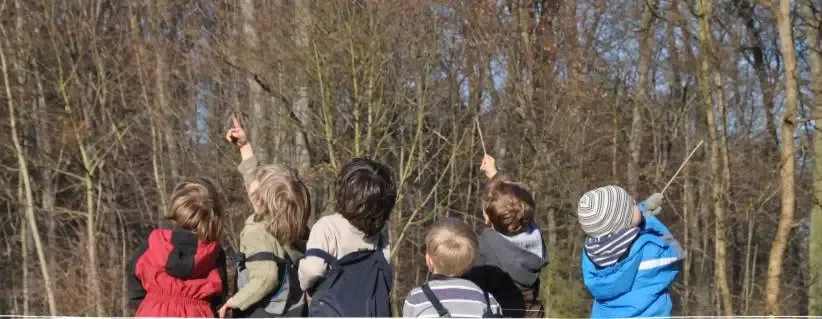
Two groups formed to explore the two available options in detail. One searched for ways to optimise the existing donation process and maintain the current model. The other explored how to become a parents association while protecting everything at Amares that all stakeholders cared deeply about.
While it was clear that voluntary financial participation wasn’t working and that raising external funds would be a challenge, there was a lot of fear about the school becoming a parents association, as this model could have repercussions for the pedagogical approach and existing high trust between all actors. Becoming a parent-led association could also lead to parents feeling pressured to take on more responsibility than they wished. One staff member said: “I love what we’ve built here so much; it would be a pity to lose it for the sake of these €125k.” This led to a breakthrough in the proposal stage: creating a ‘barometer’ to check twice a year whether a parent-led approach was working, with an option to revert to the original governance structure if not.
At the decision-making meeting, both groups formally presented their proposals. Beyond expectations, both proposals met all the criteria, and everyone was willing to go with either solution. Ironically, this made it harder to decide which path to choose, and more time was needed to discern the path forward.
Parents who can’t afford the lowest contribution level will receive support from donations.
After several weeks, a solution finally emerged: to combine the two proposals. People from the ‘optimising donations’ group committed to implement their solution even if the school became a parents association. So it was decided: Amares would become a parents association, with all the safeguards the other group had developed to protect its unique ethos to protect parents from onerous new responsibilities. In parallel, the donations pathway would also be developed, to increase the chance that no family would be turned away because they couldn’t afford the fees. “We have both now,” says Vanda. “A new legal structure and a new group of people working to raise donations.”
Financially, all parents are now better off. Before the law changed, the parental contribution to fees at Amares was €125 per child per month. As a parents association, the school will now get more money from the state, so they have been able to reduce the parental co-pay. Fees are now structured on a sliding scale, and parents can choose to pay €60, €90, or €120 euros per month per child. Those with more than one child at Amares can even choose to pay different amounts for each child. Those who can’t afford the lowest contribution level will then receive support from the donations.
In conclusion
Vanda marvels at what they have accomplished: their model attends to everyone’s needs (including parents’ differing financial needs), and it is within capacity regarding how to balance their budget. “It’s amazing. It’s a gift, especially because as far as I know, we are the only organisation in Germany that found this integrative solution. I am very chuffed that our collaborative effort led to this outcome.”
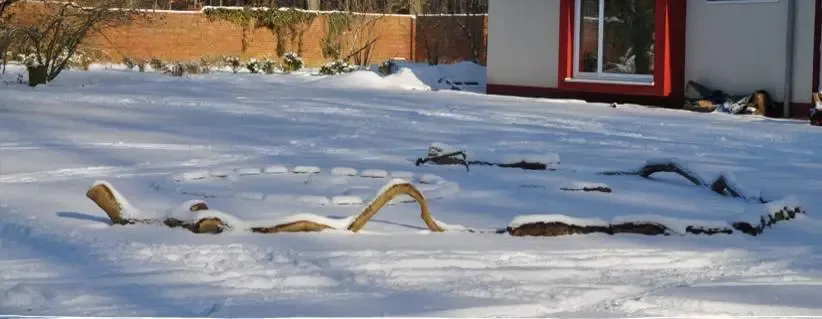
About Vanda
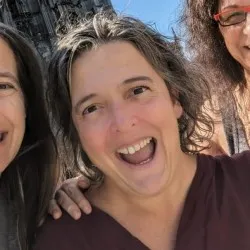
About Sabine
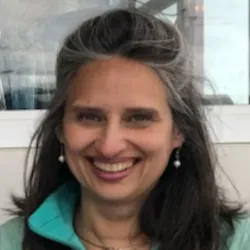
Sabine lives in the UK and is the coordinator for Sustainable Food Norwich (SFN), a partnership working to localise the food system in her area in a way that cares for people and planet. SFN collaborates with partners to address food poverty, diet-related ill health and the climate and ecological crises, while supporting local farmers, food businesses and communities to thrive.
Sabine took her first course in Convergent Facilitation in 2021. Following this, Sabine worked with Roni Wiener to explore Roni’s CF insights and wrote these up as a series of coaching tips. She has also helped steward the CF community and written or edited a number of CF case studies.